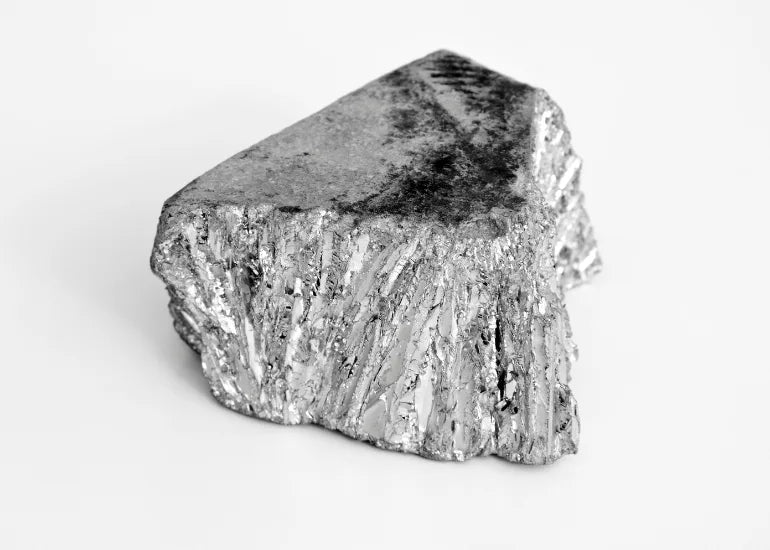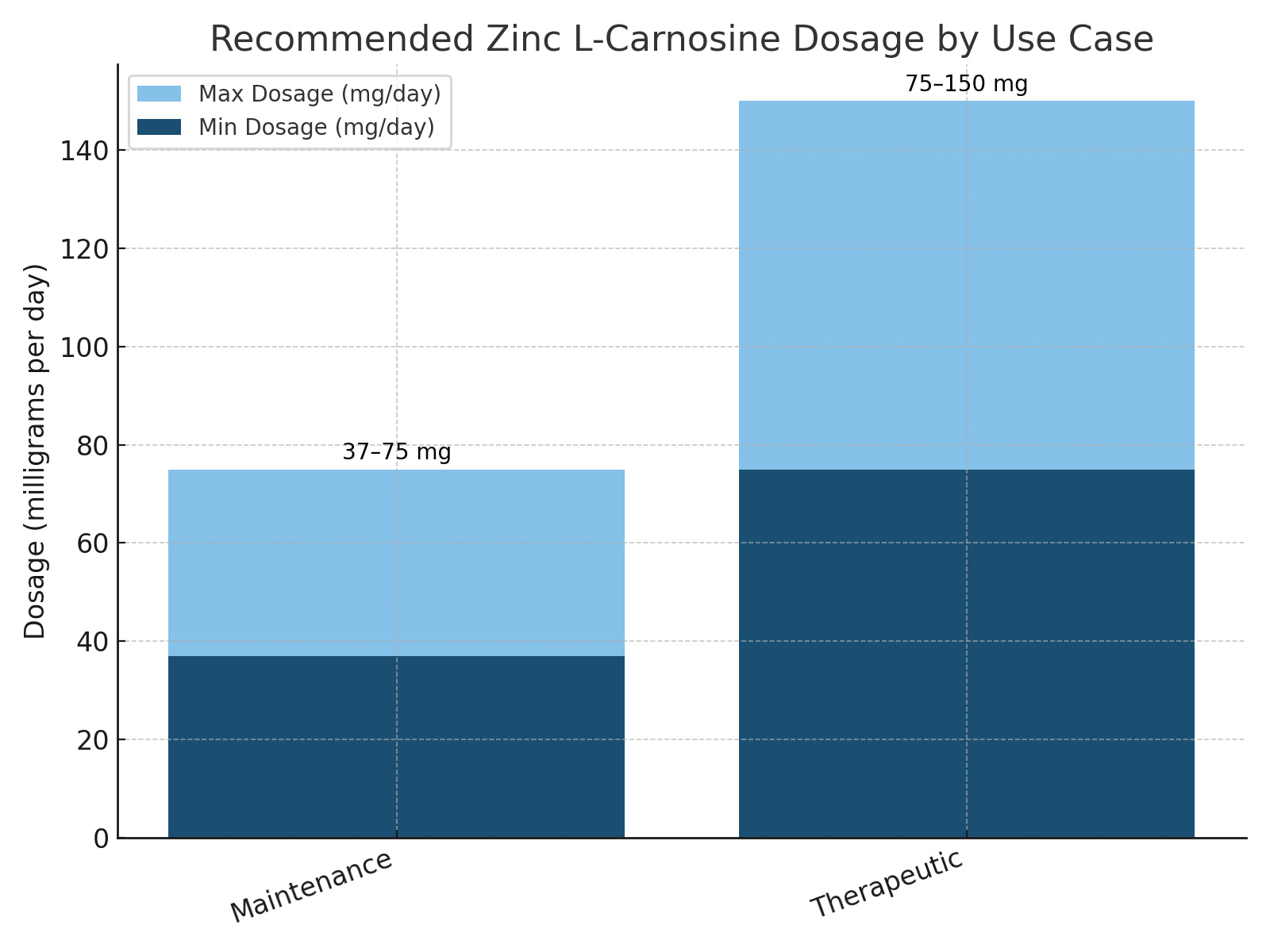
Zinc L-Carnosine is a chelated compound combining two powerful health agents zinc, a crucial trace mineral, and L-carnosine, a naturally occurring dipeptide made from the amino acids beta-alanine and histidine. This unique pairing creates a stable, slow-releasing molecule that adheres to mucosal surfaces, especially in the gastrointestinal (GI) tract.
Developed in Japan in the 1990s and widely studied in clinical settings, Zinc L-Carnosine is known for its ability to:
This compound is also sometimes referred to as polaprezinc, particularly in Japanese clinical studies and hospital use, where it is regularly prescribed for ulcers, reflux, and gastritis.
This is special in how the zinc and L-carnosine work together, where Zinc promotes tissue repair, immune response, and anti-inflammatory effects and L-Carnosine acts as a buffering agent and antioxidant that neutralizes free radicals and protects cells. Together, they form a mucosal barrier protector coating and nourishing the gut lining while delivering potent healing nutrients to the site of inflammation or erosion.
This duo targets symptoms like ulcers and heartburn and also addresses the root cause like damage to the stomach or intestinal lining.
Zinc L-Carnosine has a record of safety and effectiveness in countries like Japan and Korea. It has been extensively used for:
Today, it's embraced by holistic and functional medicine practitioners worldwide as a cornerstone supplement for gut repair.
Miduty's Leaky Gut supplement stands out in a crowded wellness market for one powerful reason: the inclusion of Zinc L-Carnosine, a clinically researched, patented compound that offers superior support for gut lining repair and mucosal protection.
Miduty ensures efficacy with a science-backed dosage. Each serving delivers 25 mg of elemental zinc from Zinc L-Carnosine, the same level used in multiple clinical studies.
Unlike standard gut health supplements that rely on generic probiotics, glutamine, or fiber alone, Miduty elevates its formula with Zinc L-Carnosine, a compound originally developed in Japan and widely used by healthcare professionals to treat gastric ulcers and mucosal damage. This combination of elemental zinc and the dipeptide L-carnosine works together to provide targeted healing. It doesn't just soothe symptoms it adheres to damaged areas of the intestinal lining, promoting deep cellular regeneration where your body needs it most.
| Uses & Benefits | Description |
| Gastrointestinal Mucosal Protection |
Zinc L-Carnosine’s primary function is to protect and regenerate the mucosal lining of the digestive tract. [1] This physically adheres to stomach and intestinal tissue for longer than other zinc forms. This lining is essential for absorbing nutrients, defending against pathogens, and preventing acid and food-related injury. When compromised, the mucosa becomes vulnerable to ulcers, erosion, inflammation, and bacterial overgrowth. Zinc L-Carnosine:
This makes it ideal for addressing chronic digestive discomfort, food sensitivity, and gastric barrier dysfunction. In studies, patients experienced rapid improvements in ulcer symptoms, often within 2–4 weeks of daily supplementation. [1] |
| Ulcer and Gastritis Support |
One of the most clinically validated uses for Zinc L-Carnosine is the treatment of gastric ulcers and gastritis. [2] It helps:
|
| Oral Mucosa and Esophageal Health |
Emerging research shows that Zinc L-Carnosine can also: [5]
Its ability to bind to soft tissues and reduce oxidative damage makes it useful far beyond the stomach. |
| Immune System Enhancement |
Both zinc and carnosine contribute to:
|
| Reduces Gut Inflammation and Acid Damage |
Zinc L-Carnosine has a buffering effect, meaning it can:
This makes it helpful for managing conditions like:
|
| Supports GI Immunity and Antioxidant Defense |
The compound boosts levels of glutathione and other antioxidants that protect gut lining cells. This, in turn, supports:
|

Clinical studies typically use:
Maintenance: 37-75 mg/day (for ongoing mucosal support, immunity, or digestive balance).
Therapeutic use is generally short-term (4-8 weeks), while maintenance can be continued long-term with physician oversight.
Best taken on an empty stomach or 30–60 minutes before meals.
For optimal results, Zinc L-Carnosine should be taken:
Zinc L-Carnosine is particularly useful:
Taking it consistently during these phases promotes faster recovery and long-term resilience of the gut lining.
For ulcer support: 2 doses daily for 8 weeks, followed by a maintenance dose
Zinc L-Carnosine is well-tolerated in most people. It is gentler on the stomach than other zinc forms due to the buffering effect of L-carnosine. Rare side effects may include:
These symptoms are usually transient and dose-related.
Avoid taking Zinc L-Carnosine at the same time with other medications:
If you are on prescription medication, always consult your doctor before starting Zinc L-Carnosine, especially for long-term use.
For enhanced gut-healing effects, Zinc L-Carnosine can be combined with:
Drink plenty of water and avoid processed, acidic, or spicy foods during gut repair protocols to support healing.
Zinc L-Carnosine is ideal for:
It's also a foundational ingredient for anyone focused on gut repair, functional medicine protocols, or immune resilience.
Here's how to make Miduty Zinc L-Carnosine a powerful part of your daily routine:
Zinc L-Carnosine is a supplement targeted as a gut-health tool, clinically validated and uniquely powerful. With Miduty's formulation, you get pure potency, real healing, and no compromises.
Zinc carnosine is known to support gut health by helping protect and repair the stomach and intestinal lining. It may aid in healing ulcers and managing other digestive issues by promoting mucosal healing and reducing inflammation.
Zinc L-carnosine is mainly used to support the stomach and intestinal lining, helping ease issues like bloating, nausea, and mild heartburn. It promotes a healthy gut environment and strengthens the stomach's natural defenses without affecting digestion or reducing stomach acid.
The length of time to take zinc carnosine depends on the condition being treated, typically ranging from a few weeks to a few months. For gut-related concerns like leaky gut, at least 8 to 12 weeks is often recommended. It's best to consult a healthcare professional for personalized guidance.
People with zinc sensitivity, kidney issues, or those already taking high-dose zinc supplements should avoid Zinc L-Carnosine unless advised by a doctor. Pregnant or breastfeeding women and individuals on certain medications should also consult a healthcare provider before use.
L-carnosine is a dipeptide made from two amino acids, while zinc carnosine is a compound combining zinc with L-carnosine. Zinc carnosine mainly supports gut lining repair, whereas L-carnosine is known for its antioxidant effects and benefits for muscle health.
